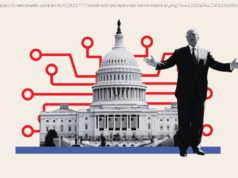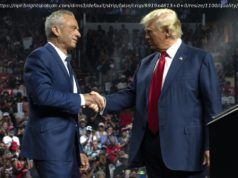In his first days in office, President Donald Trump has taken action on issues including healthcare, abortion, trade and education.
May 11 (UPI) — Donald Trump was sworn in as the 45th president of the United States on January 20 and immediately began taking action on a number of issues.
Here’s a rundown of the highlights so far: (Most recent first)
May 11
Election fraud: Trump created a commission to examine vulnerabilities in U. S. political systems and assess voter registration procedures.
Cybersecurity: Trump signed an order to hold federal agency heads accountable for the cybersecurity of their networks and calls on government and IT leaders to step up defenses against automated attacks online.
May 4
Religious politics: Trump issued an order to ease federal restrictions against political activity by tax-exempt religious organizations.
May 1
Technology council: Trump ordered the creation of the American Technology Council to upgrade the U. S. government’s use of digital services.
April 28
Offshore drilling: The president issued an order to review federal regulations and guidelines on offshore drilling in the Atlantic, Pacific and Arctic.
April 27
Whistleblowers: Trump signed an order to protect whistleblowers in the U. S. Veterans Administration, as part of his pledge to care for American service veterans.
April 26
Education: Trump signed an order directing Secretary Betsy DeVos to determine if there is too much federal oversight in U. S. education.
Federal lands: The president took executive action to review the Antiquities Act of 1906, which will ultimately evaluate national monument designations made by former Presidents Obama, Bush and Clinton.
April 25
Agriculture: Trump signed an order to review potential impediments to growth in the domestic agriculture industry. He took the action after a roundtable meeting with a number of U. S. farmers, industry officials and Ag Secretary George “Sonny” Perdue.
April 21
Deregulation: Trump signed an executive order and two memoranda. The order directs the Treasury to review tax regulations initiated last year to determine if they overreach and are cost-effective. The memoranda called for reviews of Dodd-Frank, the 2010 law against fiscal abuses that led to the financial crisis, and the Financial Stability Oversight Council’s procedure in designating banks “too big to fail.”
April 18
Labor: Trump signed the “Buy American, Hire American” executive order — an action aimed at enforcing domestic worker rules and ending “abuses” of the U. S. H-1B work visa program. It also directs federal agencies to review trade rules that might undermine the domestic labor market.
March 31
Trade: The president signed two executive actions — one ordering a review of the U. S. trade deficit and one to strengthen anti-dumping rules and enforcement. The deficit review will examine forms of “trade abuse, ” taking a country-by-country look over 90 days. The anti-dumping order directs the Homeland Security Department to ensure enforcement.
March 29
Drug abuse: Trump signed an order establishing the President’s Commission Combating Drug Addiction and the Opioid Crisis to fight the epidemic of prescription drug overuse and overdose. New Jersey Gov. Chris Christie was assigned to the panel, which seeks to fight dependence on opioid narcotics.
March 28
Environment: President Trump signed an executive order to roll back a suite of planned environmental regulations in an effort to spur energy independence. The order will kick off a review of former President Barack Obama ‘s Clean Power Plan, lift a short-term ban on leasing federal land for coal production, lift limits on coal production and return energy production authority to the states.
March 27
Education: President Trump revoked two Obama-era regulations on teacher training and school accountability. In a White House ceremony Monday, Trump referred to the actions as “removing an additional layer of bureaucracy to encourage freedom in our schools.”
Federal contractors: President Trump signed a resolution scrapping an Obama-era rule the administration said made it too easy for lawyers to target or blacklist U. S. companies and works who contract with the government. The Obama administration said the regulation even the playing field for lawful contractors.
Public lands: President Trump signed a resolution rolling back an Obama-era rule that gave the Bureau of Land Management power to conserve public lands for future use. Critics said it reduced efficiency and gave states and local government little input on land use.
March 6
Travel ban: President Trump signed a revised version of an existing order to block entry by people from six majority-Muslim nations for 90 days and ban all refugees from Syria for 120 days. The new order specified that it won’t affect people who had already been issued travel visas.
February 28
Clean Water Act: President Trump signed an executive order calling for a review of an Obama-era rule expanding the number of bodies of water under environmental protection.
Historically Black Colleges and Universities: President Trump signed an executive order moving the federal initiative on HBCUs directly to the White House instead of under the Department of Education in order to “promote excellence, ” the White House said.
Women in Science: President Trump signed two bills aiming to promote women in the STEM fields. The Protecting Women in Entrepreneurship Act calls on the National Science Foundation to “recruit and support women to expand their focus into the commercial world in its entrepreneurial programs. The Inspiring the Next Space Pioneers, Innovators, Researchers and Explorers Women Act requires NASA to encourage women and girls to study science, technology, engineering and mathematics.
Gun Control: President Trump signed a bill nullifying an Obama-era rule aimed at blocking gun sales to people found to be mentally ill.
February 24
Regulatory Reform: President Trump signed an executive order to direct federal agencies to evaluate existing regulations. The action is part of Trump’s plan to eliminate what he views as overreaching, “job-killing” restrictions.
February 16
Stream Protection: President Trump signed House Joint Resolution 38, which scraps an Obama administration environmental rule to protect waterways from coal mining waste. Trump’s administration said the rule puts mining companies at a competitive disadvantage.
February 14
Anti-Corruption Repeal: President Trump signed House Joint Resolution 41, which wipes away a federal rule that requires energy companies to disclose royalties and government payments. The rule was imposed by the Obama administration last year as a transparency measure. Trump’s government said it puts U. S. energy companies at a disadvantage.
February 9
Police Protection: Trump signed an order to review existing laws and produce legislation to better protect federal, state and local law enforcement officers. The action is a response to increased attacks against officers in the past year.
Crime Reduction: The president ordered Attorney General Jeff Sessions to create a new federal task force to share information among agencies, develop strategies, identify deficiencies in current laws, evaluate criminal data and make recommendations for greater safety of U. S. citizens.
Foreign Crime Fighting: Trump issued an executive order prioritizing efforts to prosecute foreign-based crimes like drug and human trafficking. It calls for stricter enforcement of laws already on the books and efforts to “identify, interdict, disrupt, and dismantle transnational criminal organizations.”
February 3
Wall Street Regulation: Trump signed an executive order to ease U. S. fiscal regulations in the Dodd–Frank Wall Street Reform and Consumer Protection Act of 2010 — which was a response to the financial crisis and Great Recession that Trump’s administration called “overreaching.






